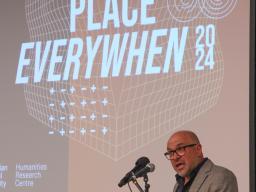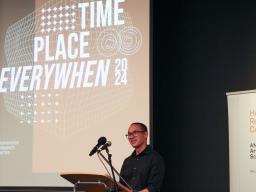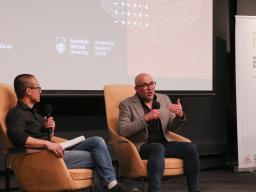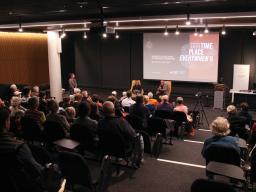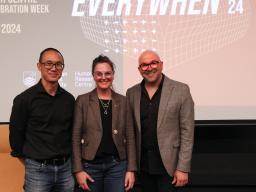
Presenting the HRC 50th Anniversary Distinguished Lecture, as part of the HRC 50th Anniversary Celebration
How to Withstand the Threats to our Shared Humanity:
"The Only Way to Fight the Plague is with Decency"
Periodically, current events propel old books to renewed public interest. After the election of Donald Trump in 2016, George Orwell's Nineteen Eighty-Four went to the top of the New York Times bestseller list. In 2020, those languishing in lockdown sought a degree of solace in the pages of Albert Camus's novel The Plague. Both post-war novels are undeniably important and one should hardly begrudge readers finding in them a fresh pertinence. But in both cases, one cannot help but feel that the interest misses the point – as though the threats to our common life were external to it: despotism and propaganda, in the first instance; pestilence, in the second.
But for Albert Camus, in particular, the immediate threat did not come from without, but inhabits the spaces between us. In the years following the Second World War, he was preoccupied with the question of how to counteract a malaise, a plague, which was incubated under the conditions of war, but which survived it, and was spreading to all corners of social and political life. He called it "the crisis of humanity". And it took the form of the corruption of our language and our technologies of communication, such that we can no longer see or hear each other, other than as avatars or ideological abstractions. Because of the coarsening of our language, the ubiquity of contempt, and the prevalence of polemic, Camus wrote, "the long dialogue among human beings has now come to an end". This is the plague.
The commons of our language – increasingly tainted by the distortions of communications technologies and poisoned by the influx of artificially generated effluent – is under threat. And with it, the conditions of democratic life. If we are to withstand these threats, we will need to recover what is most distinctly human about our modes of speech and daily interaction.
Speaker:
Scott Stephens is the ABC’s Religion & Ethics online editor and the co-host, with Waleed Aly, of The Minefield on ABC Radio National. He and Waleed Aly are also the authors of Quarterly Essay 87, Uncivil Wars: How Contempt is Corroding Democracy (2022). He has published widely on moral philosophy and democratic theory. He is editor of Justice and Hope: Essays, Lectures and Other Writings by Raimond Gaita (2023), and the co-editor and translator of two volumes of the selected writings of Slovenian philosopher Slavoj Žižek, Interrogating the Real (2005) and The Universal Exception (2006).
Please register to attend this free event.
If you require accessibility accommodations or a visitor Personal Emergency Evacuation plan please contact the event organiser.
Location
Speakers
- Scott Stephens, ABC Religion & Ethics
Contact
- Humanities Research Centre
Image Gallery
Photos from the HRC 50th Anniversary Distinguished Lecture presented by Scott Stephens (ABC)
File attachments
| Attachment | Size |
|---|---|
| 31_July_2024-Scott_Stephens_Lecture.pdf(679.59 KB) | 679.59 KB |
